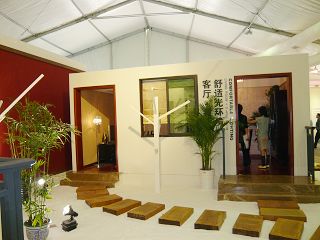The State Council?issued rules on energy conservation in civilian buildings on Thursday, aiming to reduce energy use and improve efficiency.
The buildings involved include residences, government office buildings, and structures used for commercial, educational and sanitation purposes, said the regulation.
 |
|
Energy?saving design in housing construction was highlighted during the 2008 Hangzhou Best Living Environment?Expo held?in May, 2008. [File photo]? |
Government departments at all levels should enhance their energy-saving management, cultivate energy-saving product markets and disseminate energy-saving knowledge among the public.
The regulation said China provided favorable policies and encouraged enterprises and relevant departments to adopt renewable products in new construction, such as solar energy and geothermal.
Under the regulation, government construction departments will have the power to monitor energy-saving management nationwide. They should take the responsibility of drawing up national civilian energy-saving plans and perfecting the relevant standards.
Local governments above the county level were asked to allocate funds to energy and scientific research institutions to encourage research into energy-saving technologies.
Further, imports of energy-intensive technology, material or equipment would be restricted or banned.
Governments at all levels were asked to renovate buildings to meet conservation standards, focusing on such areas as ventilation systems.
If construction enterprises buy or use energy-intensive products, they could face penalties of 200,000 yuan (US$30,000) to 500,000 yuan. Design institutes that violate the rules will face penalties of 100,000 yuan to 300,000 yuan.
The new regulations are seen as a significant move in China's efforts to cut energy use and reduce pollution. The country has set a target of reducing energy intensity by 20 percent between 2005 and 2010.
(Xinhua News Agency August 8, 2008)